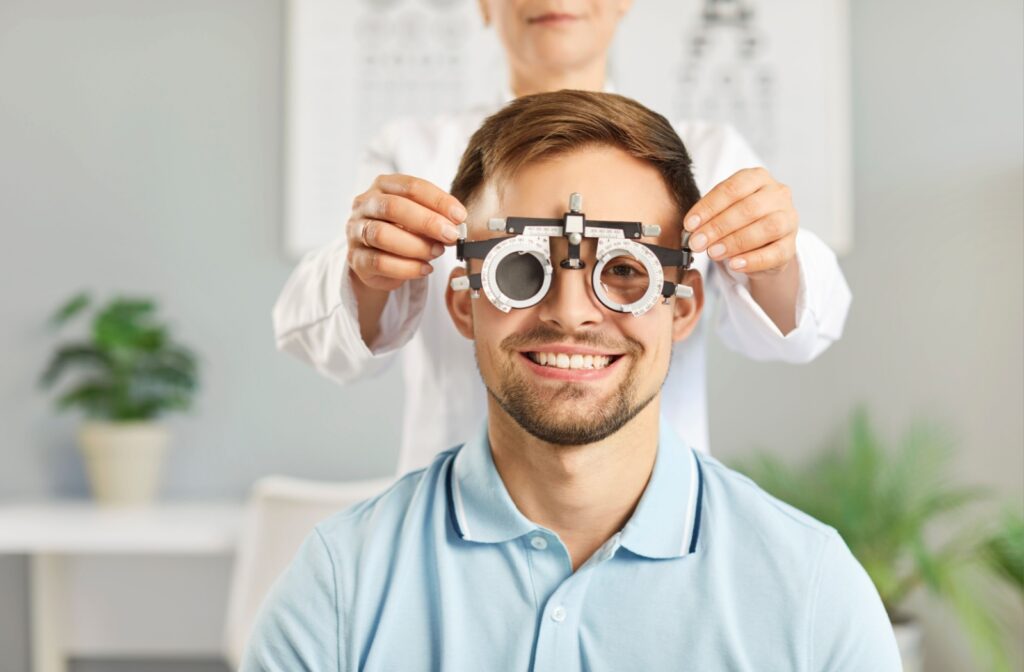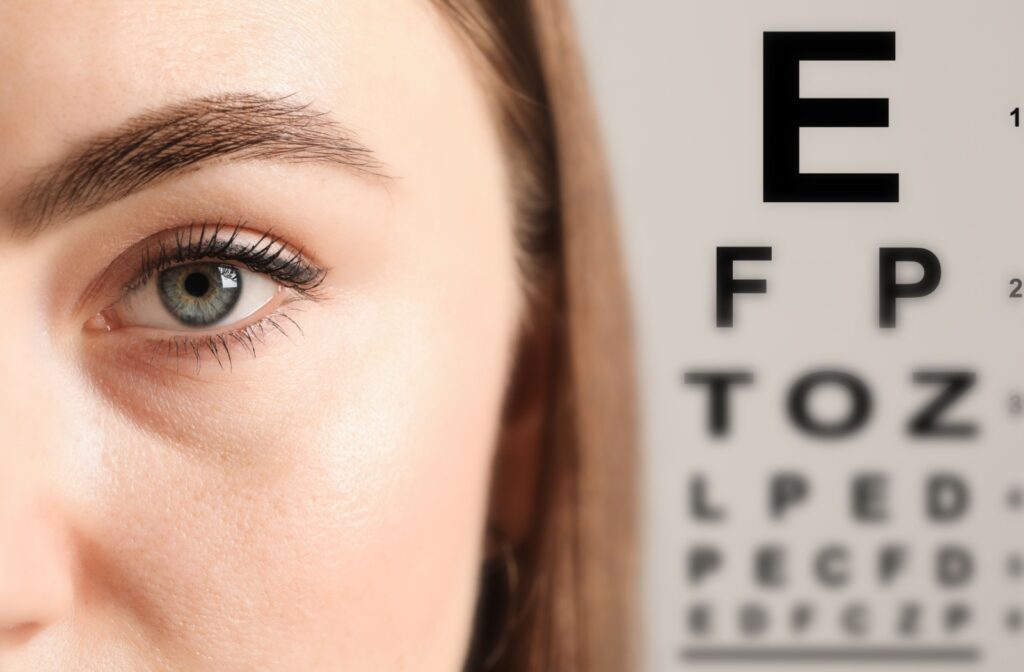Scheduling time for an eye exam might seem like one more thing to fit into your busy schedule. But regular eye exams are one of the most important parts of staying on top of your vision and overall health. Even if you aren’t experiencing vision changes, eye exams can reveal a host of subtle underlying problems, making these exams invaluable.
On average, a comprehensive eye exam takes between 30-60 minutes. This can vary depending on the type of exam and your specific needs. You should visit your optometrist at least once every 2 years, or more often if you notice any changes in your vision.
What Happens During a Comprehensive Eye Exam?
Comprehensive eye exams are more than just a quick vision check. They also help detect early signs of potential issues and ensure your vision prescription is accurate.
During your visit, our team will evaluate your vision and assess your need for correction. If you have any vision problems, we can take steps to prevent them from interfering with your quality of life. Meanwhile, we also check for conditions like cataracts, age-related macular degeneration, glaucoma, and more.
We can even detect broader health concerns like diabetes. By examining your eye structure and retina, we can detect signs of these conditions before they damage your vision. That’s why regular exams are so important for your overall health—they’re also about proactive care.
How Long Does the Exam Take?
A standard comprehensive eye exam typically takes about 30 minutes. However, this can go up to an hour if you need more extensive testing. If you’re experiencing vision problems, we’ll take the time to look for the cause of your underlying problem.
Children’s eye exams also tend to take longer, as their developing eyes need detailed evaluations. Young eyes are constantly growing and changing, so these exams are about monitoring how a child’s eyes and vision develop in the long term.
Seniors might also require additional assessments to manage age-related conditions such as glaucoma or cataracts.
How Often Should You Book an Eye Exam?
Your age, health, and medical history all play a role in determining how often you should schedule exams. Here are some general guidelines:
- Children should have their first eye exam around 6 months old, and another before entering school. Then, annual children’s eye exams are recommended until the age of 18.
- Adults aged 20-64 should schedule comprehensive eye exams at least once every 2 years, or more often if experiencing any abnormal vision problems.
- Seniors aged 65+ should schedule senior eye exams at least once every year, or more often if living with conditions like cataracts, glaucoma, or vision problems.
- Any person living with diabetes should schedule a diabetic eye exam at least once every year, or more often if experiencing diabetes-related eye complications.
Eye health changes with age, so regular eye exams are a great way to give your eyes the care they need. Even if you aren’t experiencing anything unusual, eye exams are valuable.
What Is a Contact Lens Exam?
If you wear or are considering contact lenses, you’ll need lenses designed to fit your unique eye. Contact lenses should be comfortable and safe while providing you with clarity, so a custom approach is key.
This is where contact lens exams shine. They start with detailed eye measurements so that our team can gain a full understanding of your eyes. If you’re a first-time wearer, you’ll receive instructions on how to insert, remove, and care for your lenses. We also provide trial lenses so you can test them before finalizing your prescription.
This process typically takes 45-60 minutes, especially if it’s your first time being fitted for contacts. The extra time helps make your transition to contacts smooth and safe.

Why Are Diabetic Eye Exams So Important?
For those living with diabetes, managing eye health is critical. Diabetic eye exams allow us to screen for complications like diabetic retinopathy, glaucoma, and cataracts.
Some exams may include dilating your pupils to get a better look at the retina. We’ll also use special imaging technology to gain detailed views of your retina and optic nerve. This lets us monitor any changes in your eyes caused by diabetes.
These exams generally take about 60 minutes. We’ll need to dilate your pupils, and this takes a few minutes. The information provided during a diabetic eye exam makes managing diabetes much simpler, and lets us catch potential problems before they damage your vision.
The Value of Additional Screening
Routine eye exams can identify several conditions, even before symptoms appear. Some of the issues we screen for include:
- Glaucoma, which damages the optic nerve and can lead to vision loss.
- Retinal and macular conditions, including age-related macular degeneration.
- Cataracts, which cloud the eye’s natural lens over time.
- Corneal and surface issues, such as dry eye.
- Systemic health conditions like vascular abnormalities or diabetic changes.
Early detection of these conditions means you can start treatment sooner rather than later. This is the easiest way to stay ahead of lifelong vision complications.
How to Tell if It’s Time for Your Next Eye Exam
It’s not always obvious when to book your next eye exam. Watch out for:
- Changes in vision, such as blurriness or difficulty focusing
- Frequent headaches or eye strain
- Sensitivity to light or difficulty seeing in low light
If any of these sound familiar, it’s time to prioritize your eye health and schedule an appointment.
Schedule Your Next Eye Exam Today!
Taking the time for an eye exam is an investment in your overall eye health. Every visit is a chance to learn more about your eyes, your vision, and your overall well-being. And our team at Vision One Boise is here to help. From comprehensive exams to screenings for specific conditions, we can help you stay ahead of potential problems and keep your vision clear. Book your next appointment today and take the next step in prioritizing your eye health.



